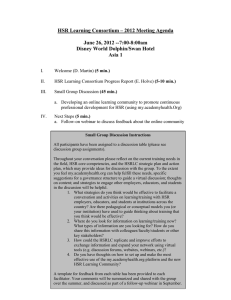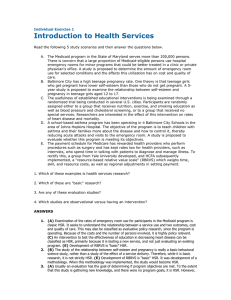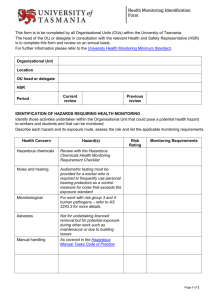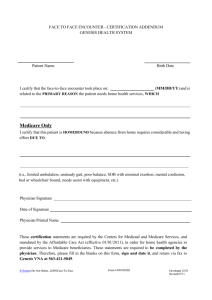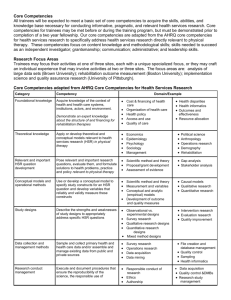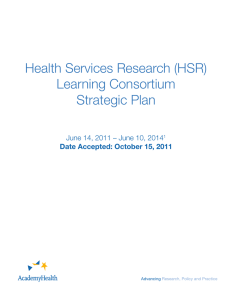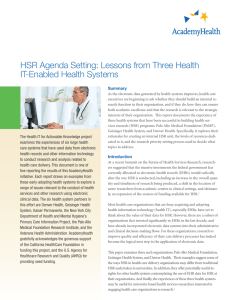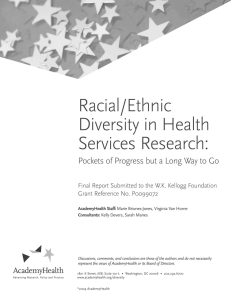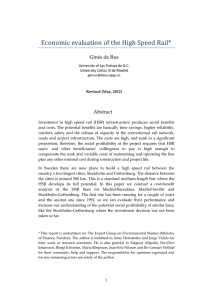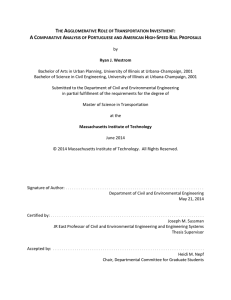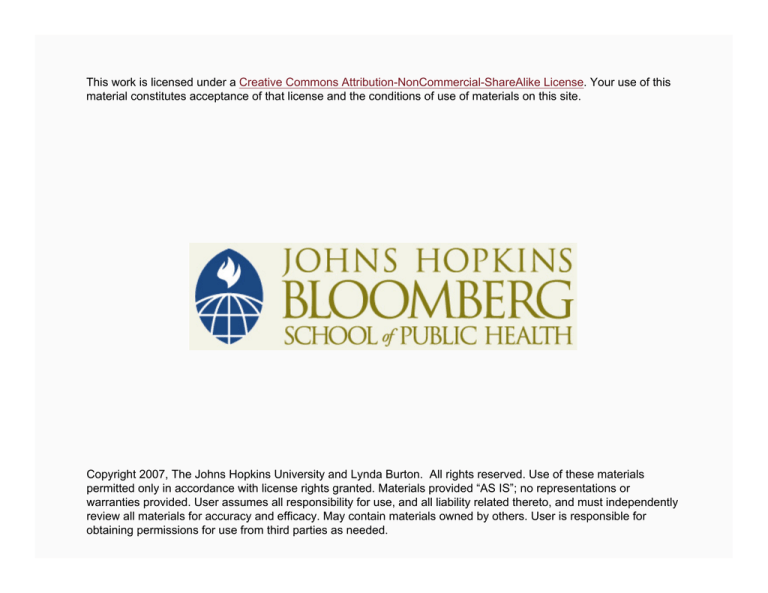
This work is licensed under a Creative Commons Attribution-NonCommercial-ShareAlike License. Your use of this
material constitutes acceptance of that license and the conditions of use of materials on this site.
Copyright 2007, The Johns Hopkins University and Lynda Burton. All rights reserved. Use of these materials
permitted only in accordance with license rights granted. Materials provided “AS IS”; no representations or
warranties provided. User assumes all responsibility for use, and all liability related thereto, and must independently
review all materials for accuracy and efficacy. May contain materials owned by others. User is responsible for
obtaining permissions for use from third parties as needed.
Introduction to Health Services Research
Lynda Burton, ScD
Johns Hopkins University
Section A
Definitions
Health Services Research—Defined
The Institute of Medicine, defines Health Services Research
(HSR) as an inquiry to produce knowledge about the . . .
− Structure
− Process, or
− Effects (outcomes)
. . . Of personal health services
4
Two Criteria for an HSR Study
The study deals with some features of structure, process, or
effects on personal health care
At least one of the study’s features is related to a conceptual
framework other than that of contemporary biomedical
science
5
Examples of Structure
Structure
− Physician workforce requirement
− Structure of the delivery system
6
Examples of Process
Process
− Use of different types of services
− Access
7
Examples of Outcomes
Outcomes
− Changes in health, functional status
− Change in symptomatology, severity
− Satisfaction with care
8
Examples of Outcomes
Outcomes
− Changes in health, functional status
− Change in symptomatology, severity
− Satisfaction with care
− Costs of care
− Quality of life
9
Dimensions of HSR
Health Services
Research
Health Services
Evaluation
Non-Policy
Research
Policy
Research
10
Basic or Methods-Oriented HSR
Health Services
Research
Health Services
Evaluation
Non-Policy Basic or methods
oriented research
Relevant
Policy
Relevant
11
Basic or Methods-Oriented HSR
The application of scientific method for the purpose of
advancing knowledge and understanding regarding an
aspect of the health services system
The primary purpose of this research is to contribute to the
further development of “disciplinary” knowledge
12
Basic or Methods-Oriented HSR: Examples
Developing methods to measure quality of home health care
Developing measure of global health (SF 36)
Developing measure of patient satisfaction
Inferring quality of hospital care from hospital claims data
Revising Medicare physician payment structure
13
Basic Health Policy Research
Health Services
Research
Health Services
Evaluation
Non-Policy Basic or methods
oriented research
Relevant
Policy
Relevant
Basic policy
research
14
Basic Health Policy Research
Research into specific problems, issues or delivery modes
within the health services system, the results of which are to
be used directly by those individuals responsible for making
decisions that affect the health care of an identifiable group
of persons
15
Health Policy Research and Evaluation: Examples
Can addition of a general preventive visit for older Medicare
beneficiaries result in better outcomes?
Can care for acutely ill older persons in a “home hospital”
reduce complications?
What method of risk-adjusting payments for Medicare
managed care patients will result in a more equitable
payment structure?
16
Health Program Evaluation
Health Services
Research
Non-Policy Basic or methods
oriented research
Relevant
Policy
Relevant
Health Services
Evaluation
Program
evaluation
Basic policy
research
17
Health Program Evaluation
The application of scientific methods, or approximations, in
assessing the degree to which an organized set of health care
related activities has reached its intended objectives
18
Health Program Evaluation: Examples
Does a school-based asthma program increase child and
family knowledge of asthma and reduce acute incidents
requiring ER visits?
Can a Veterans Administration-based hospice program
improve the quality of life of participants?
Elder health—are outcomes better in a capitated system?
19
Evaluative Policy Research
Health Services
Research
Health Services
Evaluation
Non-Policy Basic or methods
oriented research
Relevant
Program
evaluation
Policy
Relevant
Evaluative
policy research
Basic policy
research
20
Evaluative Policy Research
Research into the effect on outcomes (health, costs,
satisfaction, utilization of services) of specific policies that
have been put into place by government
21
Evaluative Policy Research: Examples
Effectiveness of cancer screening
− Prostate cancer
− Breast cancer
Effect of regionalization of medical services
− CAT scanners
− Neonatal intensive services
Effect of change in health insurance benefits on use of
medical care and health outcomes
22
Health Policy Analysis
An activity that involves the compilation of the results of
health services research and evaluation and other
information
The goal of this activity is to develop and assess alternative
strategies for dealing with a specific problem associated with
the delivery of health care to an identifiable population group
23
Determining if HSRE Is Policy Relevant—Some Criteria
How important is the question being addressed to the
decision makers?
Are the patient/consumer population groups that are being
studied of direct concern to the decision makers?
Are the results of the study generalizable to other situations
and settings?
24
Section B
Categorizing HSRE
Different Ways to Categorize HSRE
By level of subject matter . . .
− Clinical
− Institutional
− Systemic environmental
By content
By use
26
Levels of Health Services Research
Clinical
Health Problems
Social, Political,
Economic Problems
27
Clinically-Oriented Studies
Attempt to discover the characteristics of provider and
patients and combinations of resources employed in practice
settings that affect the process and outcome of care
28
Clinically-Oriented Studies (Examples)
Physician attitudes toward prevention
Physician response to being “cued” regarding a patient’s
score on a depression scale
Use of midwives
Outcomes of caring for acutely ill older persons in a “home
hospital”
29
Levels of Health Services Research
Institutional
Clinical
Health Problems
Social, Political,
Economic Problems
30
Institutionally-Oriented Studies
Same as clinically-oriented studies except the focus is on
organizational and administrative features
31
Institutionally-Oriented Studies (Examples)
Effect of size and location of nursing home on incidence of
decubitus ulcers
Comparison of rates of surgical procedures by hospital
− Example—Caesarean sections
Comparison of heart surgery survival rates between high- and
low-volume hospitals
Home hospital
32
Levels of Health Services Research
Systemic
Institutional
Clinical
Health Problems
Social, Political,
Economic Problems
33
Systemic Studies
Deal with features of health services system that affect the
inter-relationship among providers, institutions, and patient
populations
34
Systemic Studies (Examples)
Regionalization of trauma centers
Access to care in HMOs vs. FFS
Change in costs to Medicare from growth in out-patient
surgery
Effect of HEDIS reports on consumer behavior in HMOs
35
Levels of Health Services Research
Environmental
Systemic
Institutional
Clinical
Health Problems
Social, Political,
Economic Problems
36
Environmental Studies
Seek to understand the circumstances and events in the
larger social, political, and economic context that shape the
health services system and define its societal functions
37
Environmental Studies (Examples)
Association of mortality and poverty
Effect on mental health of children of violence
Cultural differences in end of life decision-making
Effect of social insurance (Medicare) on health of older
persons
38
Content Areas
Organization and financing of care
Clinical evaluations and outcomes of care
Quality of care
Patient satisfaction with care
Provider and consumer behavior
Work force and training issues
39
Examples of Uses
Evaluation of new technologies
Problem solving
Evaluation of interventions
40
Uses: Evaluation of Innovations and Technologies
For these types of projects, the issues are largely clear
Problems are understood and alternatives have been
identified
41
Evolution and Diffusion of Health Care Technology
Biomedical Research
Health Services Research
Basic research
Applied research
Application
Transfer
Diffusion
System impact
42
Uses: Problem Solving
Problem identification—usually descriptive
Problem specification—quantifies and identifies factors
presumed to contribute to a problem
Assessment of alternative interventions—identifies
intervention strategies and assesses the relative cost and
effect of these strategies
43
Uses: Evaluation of Implementation Process
Attempts to assess the degree to which program operates as
intended and to identify causes and consequences of
deviations
44
Uses: Evaluation of Effects
Measures the extent to which interventions attain stated
objectives
Identifies their unanticipated consequences
Explains how the effects came about
45
The Scope of Health Services Research
The HSR field is not usually considered a distinct academic
discipline
The field gains coherence by concentrating on a distinct set
of questions and problems
− Outcomes
− Methodology and study design
− Population based
− Primary and secondary data collection
− Survey research
46
The Scope of Health Services Research
In general it is an “applied” field
The body of knowledge blends many theoretical academic
disciplines
47
General Types of Research
Organization and financing of care
Clinical evaluations and outcomes research
Quality of care
Patient satisfaction
Provider and consumer behavior
Work force and training issues
48
Difficulties in Carrying Out HSR
Complexity of problems addressed
Variable nature of methods of disciplines
General weak nature of data systems
Difficulty of establishing truly experimental designs in real
world settings
49
Major Funding Sources for HSR
Agency for Health Care Research and Quality (AHRQ, formerly
AHCPR)
Center for Medicare/Medicaid Studies (CMS, formerly HCFA)
National Institutes of Health
Veterans Administration
Foundations interested in health policy
Private associations
50
Types of Health Services Research
Descriptive studies
− The objective is to estimate quantitative parameters that
apply to groups of individuals or organizations
51
Types of Health Services Research
Analytic studies
− The objective is to answer cause-and-effect questions
− It requires theoretical models and ways of demonstrating
that causal interpretations are logically consistent with
what is already known
52

